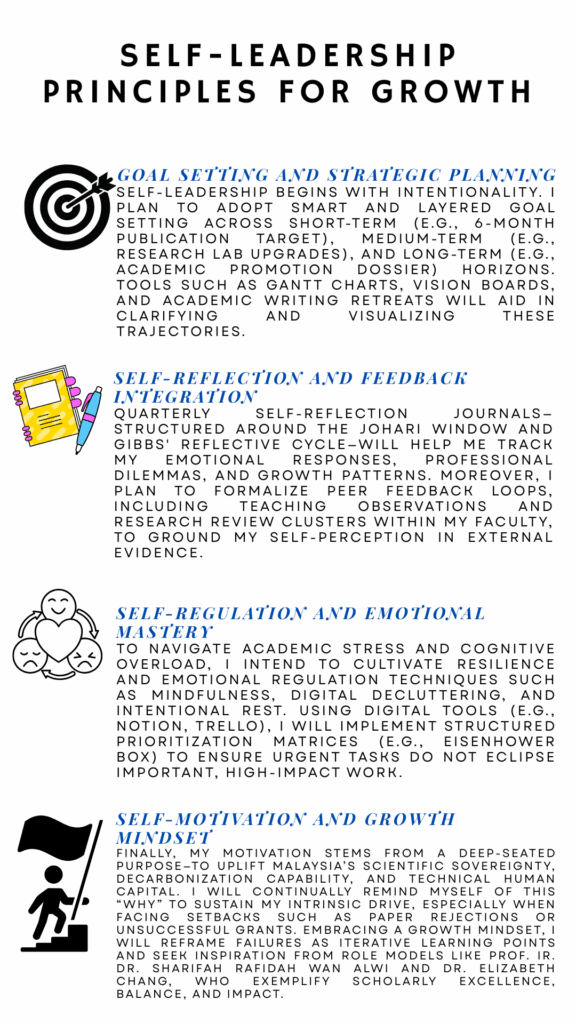Defining Self-Leadership in the Academic Context
Self-leadership, in the realm of academia, extends beyond personal effectiveness; it encompasses a deliberate, reflective, and autonomous journey of shaping one’s identity as a scholar, educator, and contributor to the public intellectual sphere. To me, self-leadership is the capacity to guide oneself towards professional excellence, ethical integrity, and purposeful scholarship through conscious goal-setting, intrinsic motivation, and adaptive self-regulation. Within the context of Universiti Teknologi Malaysia (UTM), this leadership paradigm is particularly critical,as junior academics navigate the demands of teaching, research, service, and impact under evolving institutional and national expectations such as the MyRA, SETARA, and SDG-aligned KPIs.
Reflecting on Strengths: Foundations of My Academic Identity
Since joining UTM as a junior lecturer, my role has been enriched by several personal strengths that have shaped my early trajectory. One of the most impactful is my ability to synthesize research and pedagogy by bridging industrial relevance and scholarly rigor in petroleum engineering education. This is evident in the way I develop curriculum content that integrates contemporary industry practices with core engineering principles.
Another core strength is interdisciplinary collaboration and networking. I am naturally drawn to collaborative research, as seen in my work with PETRONAS Carigali, UTP, and international partners. These engagements have broadened my research lens, while embedding me in transdisciplinary networks that foster innovation and mentorship opportunities for my students.
Furthermore, I value student-centered engagement. As a lecturer, I do not see students as passive recipients of knowledge but as co-constructors of learning. My use of experiential hooks, such as industrial case simulations and field data analysis, encourages analytical thinking, teamwork, and contextual learning.
Areas for Improvement: Recognizing Gaps and Tensions
Despite these strengths, several areas remain in need of growth. One of my most pressing challenges is balancing multiple academic roles simultaneously. As a junior academic, I often find myself straddling several responsibilities, course coordination, research administration, postgraduate supervision, industry consultations, and event planning. While these are all intellectually fulfilling, the cognitive and temporal load occasionally impedes my ability to write regularly for high-impact journals or engage deeply with theoretical literature.
Second, I recognize the need to develop a stronger scholarly voice in publication. Although I have published during my doctoral journey, transitioning from student-led research to PI-driven publications requires a more assertive intellectual positioning. I aim to deepen my theoretical grounding in carbon sequestration thermodynamics and integrate critical lenses from environmental policy, energy justice, and techno-economic systems to elevate the originality and citation impact of my work.
Third, time management and assertive boundary setting require attention. I often overcommit to short-term requests (e.g., technical committees, peer reviews, grant application panels), which delays long-term strategic activities such as research planning, grant scouting, or personal development courses. Without conscious intervention, this reactive pattern could lead to burnout and diluted impact.
Projecting the Next Decade: Vision of a Purposeful Scholar
In the next ten years, I envision myself as a recognized scholar-leader in energy transition and sustainable petroleum systems, contributing actively to Malaysia’s decarbonization roadmap and global CCS discourses. Specifically, I aim to:
- Establish a Centre of Excellence on Bio-based Fluids and Subsurface Energy Transition at UTM that integrates research, training, and industry innovation.
- Attain professorial rank by demonstrating leadership in impactful publications (e.g., Q1 SCIE journals), external grants (e.g., FRGS, PRGS, IRU-International), and policy contributions to the Ministry of Energy Transition and Water Transformation (PETRA).
- Expand regional leadership, becoming a focal point for Southeast Asian CCS capacity building through workshops, student exchanges, and technical advisory roles in SPE Asia Pacific or MOGSC.
- Mentor the next generation, not only through postgraduate supervision but also via structured research mentorship programs for early-career women in engineering.
This trajectory, however, is contingent on embedding self-leadership principles into my professional conduct.
Applying Self-Leadership Principles for Growth



Hi, this is a comment.
To get started with moderating, editing, and deleting comments, please visit the Comments screen in the dashboard.
Commenter avatars come from Gravatar.